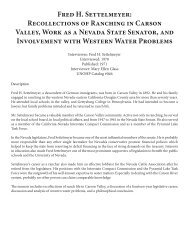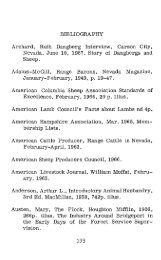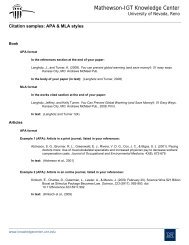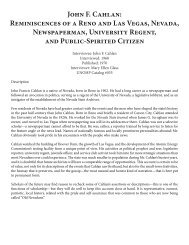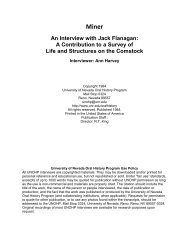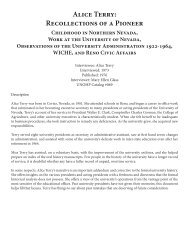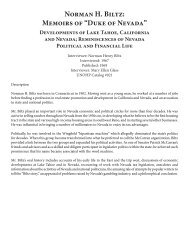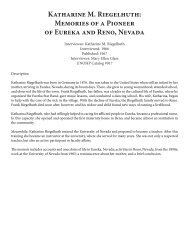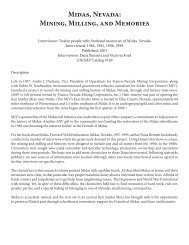Silvio Petricciani - University of Nevada, Reno
Silvio Petricciani - University of Nevada, Reno
Silvio Petricciani - University of Nevada, Reno
Create successful ePaper yourself
Turn your PDF publications into a flip-book with our unique Google optimized e-Paper software.
U.S. Army, 1943-1945<br />
71<br />
Line, and we stayed there for about oh, it<br />
was a little over a week before we gather or<br />
muster up all our forces to really make an<br />
assault on the Siegfried Line. And what I<br />
used to do is—I had some clear area out there<br />
and any vehicle that was broken, I would<br />
bring it out there and work on it. So one<br />
morning I was out there, and I was working<br />
on a jeep, but I had a radio with me (battery<br />
operated) and I used to go in and listen to<br />
the Armed Forces news at certain times. And<br />
this morning it was nine o’clock and the news<br />
was coming on, so I came on inside to listen<br />
to the Armed Forces news. And I was sitting<br />
on an orange crate in the room there, and<br />
all <strong>of</strong> a sudden I got knocked <strong>of</strong>f the orange<br />
crate. A German eighty-eight shell came in<br />
and just—well, it hit that jeep and just blew<br />
it to smithereens.<br />
So, all the fellows said, “Well, we’d better<br />
go pick up Pete again; last I saw him he was<br />
out there working on the jeep.” I was laying<br />
on the floor inside the farmhouse listening to<br />
the news [laughing]! So that took care <strong>of</strong> that.<br />
We went on through, and we crossed the<br />
Siegfried Line, went on through and across<br />
the Rhine River, and on down into a little town<br />
called Landsburg, Austria. And that’s where<br />
we were taken <strong>of</strong>f the line just a week before<br />
the war ended.<br />
But, again, an incident that kind <strong>of</strong><br />
rubbed me the wrong way, when I mentioned<br />
earlier that after finding out a few things that<br />
everything didn’t seem quite like it should be<br />
with World War II, and the thing that turned<br />
me <strong>of</strong>f completely was, we were holed up in<br />
a factory. And <strong>of</strong> course, GIs, young fellows,<br />
they get snoopy and they have to go around<br />
every place and see everything. As a matter<br />
<strong>of</strong> fact, the Germans had quite a time with it<br />
because they would have little pens like that,<br />
you know, that they’d leave around. People’d<br />
pick them up, and they’d blow up and blow<br />
their hands <strong>of</strong>f or something. They didn’t<br />
particularly care to kill anybody. If they’d<br />
maim them, why it just put that man out <strong>of</strong><br />
action and it would take two or three guys to<br />
bring him back to the hospital. So it just meant<br />
taking men <strong>of</strong>f the front lines to take care <strong>of</strong> a<br />
wounded man. I mean this was their object in<br />
doing it. They didn’t care about killing people.<br />
They just wanted to maim them or wound<br />
them so they would have to be taken back.<br />
And that just took that many men <strong>of</strong>f from<br />
the fighting force.<br />
But anyway, this other fellow and I were<br />
snooping around this factory and strangely<br />
enough, towards the end <strong>of</strong> the war, civilian<br />
trucks and transportation in Germany were<br />
converted to burning charcoal for their fuel.<br />
And in so doing, they had to have—they had<br />
a big boiler on the back <strong>of</strong> the bus and then<br />
they had a little twelve-volt electric motor<br />
that turned the fan that would blow this gas<br />
from the burned charcoal up to the front <strong>of</strong><br />
the engine, so that the engine could utilize it<br />
to run. And this factory that we were in was<br />
one <strong>of</strong> the factories that was installing these<br />
motors and installing the charcoal burning<br />
boilers on these buses and trucks and so forth.<br />
So we went into one <strong>of</strong> the rooms where they<br />
had a big supply <strong>of</strong> these little electric motors.<br />
And you must remember that World War II<br />
started on December seventh <strong>of</strong> 1941, and<br />
the name plates on these little twelve-volt<br />
electric motors was Electrolux Corporation<br />
<strong>of</strong> America 1943! So that kind <strong>of</strong> turned me<br />
<strong>of</strong>f and made me wonder whether it was really<br />
worth it or not.<br />
Of course, then after the war was over<br />
we were occupation for quite some time.<br />
And that was very enjoyable there. We had<br />
homes to live in, and I was in charge <strong>of</strong> one<br />
house where several <strong>of</strong> us stayed. And it was<br />
very interesting. We had the USO-supplied<br />
doughnuts and stuff.



